Calibration circuits and methods for a proximity detector using a first rotation detector for a determined time period and a second rotation detector after the determined time period
a technology of proximity detector and calibration circuit, which is applied in the field of integrated circuits, can solve the problems of inaccurate output, degraded calibration threshold, and inability to accurately determine the time period of the calibration,
- Summary
- Abstract
- Description
- Claims
- Application Information
AI Technical Summary
Benefits of technology
Problems solved by technology
Method used
Image
Examples
Embodiment Construction
[0026]Before describing the present invention, some introductory concepts and terminology are explained. As used herein, the term “peak detector circuit” is used to describe a circuit that can hold a signal representative of a positive peak or a negative peak (or both) of a magnetic field signal. It should be understood that both a peak-referenced detector and a peak-to-peak percentage detector employ a peak detector circuit of some sort.
[0027]Operation of a so-called “calibration mode” is described herein. Reference is also made herein to a so-called “running mode,” in particular, a running mode associated with a peak-to-peak percentage detector. Operation of the running mode is described in greater detail in one or more of the above-mentioned patents, notably, U.S. Pat. No. 5,917,320 and U.S. patent application Ser. No. 11 / 333,522, which, along with all of the above-mentioned patents, are incorporated by reference herein in their entirety.
[0028]Referring to FIG. 1, an exemplary in...
PUM
 Login to View More
Login to View More Abstract
Description
Claims
Application Information
 Login to View More
Login to View More - R&D
- Intellectual Property
- Life Sciences
- Materials
- Tech Scout
- Unparalleled Data Quality
- Higher Quality Content
- 60% Fewer Hallucinations
Browse by: Latest US Patents, China's latest patents, Technical Efficacy Thesaurus, Application Domain, Technology Topic, Popular Technical Reports.
© 2025 PatSnap. All rights reserved.Legal|Privacy policy|Modern Slavery Act Transparency Statement|Sitemap|About US| Contact US: help@patsnap.com



